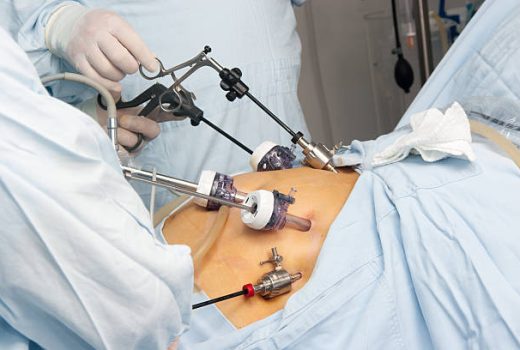
LAPAROSCOPIC GENERAL SURGERY
Laparoscopy represents a prime example of cutting-edge surgical techniques that offer the advantage of minimal invasiveness, resulting in virtually scarless procedures. With extensive expertise in performing surgeries for conditions such as hernias, appendicitis, gall bladder stones, intestinal perforations, and hiatus hernias, our team excels in delivering advanced surgical care with a focus on patient comfort and optimal outcomes.
1st to perform ROBOTIC General SURGERY IN INDORE
Dr. Mahak Bhandari is a trailblazer and the foremost expert in the field of Robotic General Surgeries in Indore. With an impressive track record, he has successfully performed pioneering procedures such as Robotic Hernia Repair, Robotic Appendectomy for Appendix, Robotic Cholecystectomy for Gall Stones, and Robotic Fundoplication for Hiatus Hernia.
Dr. Bhandari proudly holds the distinction of being the very first surgeon to introduce and perform robotic general surgeries in both Madhya Pradesh and Rajasthan. His unmatched expertise and extensive experience make him the leading choice for patients seeking the most advanced and effective robotic surgical solutions in the region.
“What is ADVANCED LAPAROSCOPIC SURGERY and why it’s more beneficial?
Advanced laparoscopic surgery, also known as minimally invasive surgery or keyhole surgery, is a surgical technique used to perform various procedures with smaller incisions than traditional open surgery. This approach involves the use of specialized instruments and a laparoscope, which is a thin, flexible tube with a camera and light source, to visualize and perform surgery inside the body. Here are some key aspects and benefits of advanced laparoscopic surgery:
- Smaller Incisions: Laparoscopic surgery requires smaller incisions, resulting in less tissue damage and scarring.
- Reduced Pain and Discomfort: Patients often experience less postoperative pain and discomfort.
- Faster Recovery: Patients can typically return to regular activities sooner, with shorter hospital stays.
- Lower Risk of Infections: Smaller incisions lead to a decreased risk of wound infections.
- Improved Cosmesis: Smaller scars are cosmetically more appealing, especially in visible areas.
- Lower Blood Loss: Laparoscopic surgery involves minimal blood loss, reducing the risk of complications.
- Enhanced Visualization: Surgeons have a magnified view of the surgical site for precision.
- Less Trauma to Surrounding Tissues: Minimal disruption to surrounding tissues reduces complications.
- Wide Range of Applications: Laparoscopic surgery is versatile, used in various medical specialties.
- Improved Outcomes: Overall, laparoscopic surgery often results in better patient outcomes.
